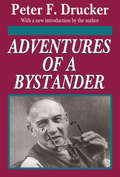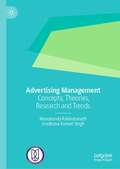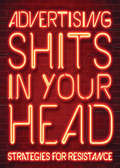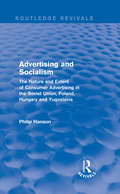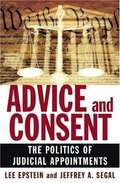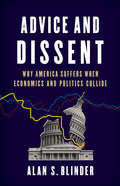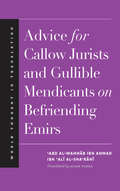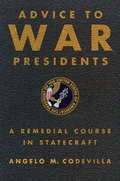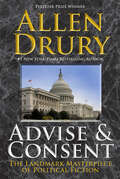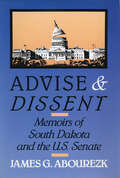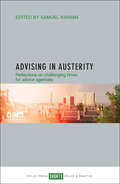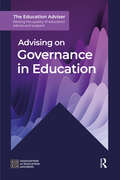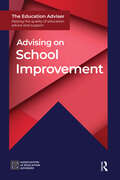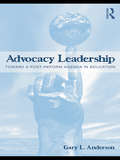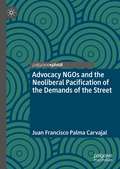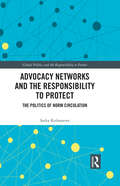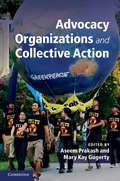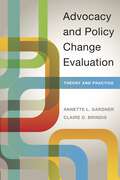- Table View
- List View
Adventures of a Bystander (Trailblazers Ser. #Vol. 2)
by Peter DruckerPeter Drucker's lively and thoughtful memoirs are now available in paperback with a new introduction by the author. He writes with wit and spirit about people he has encountered in a long and varied life, including Sigmund Freud, Henry Luce, Alfred Sloan, John L. Lewis, and Marshall McLuhan. After beginning with his childhood in Vienna during and after World War I, Drucker moves on to Europe in the 1920s and early 1930s, describing the imminent doom posed by Hitler and the Nazis. He then goes on to describe London during the 1930s, America during the New Deal era, the World War II years, and beyond. According to John Brooks of The New York Times Book Review, "Peter Drucker is at a corner cafe, delightfully regaling anyone who will listen with tales of what must be one of the more varied—and for a practitioner of such a narrow skill as that of management counseling, astonishing—of contemporary professional lives." Dorothy Rabinowitz of the Washington Post writes, "The famous are here as well as the infamous.... All are the beneficiaries, for better or for worse, of Drucker's unerring eye for psychological detail, his remorseless curiosity, and his imaginative sympathy.... Drucker's book appears in a stroke to have restored the art of the memoir and of the essay." Adventures of a Bystander reflects Drucker's vitality, infinite curiosity, and interest in people, ideas, and the forces behind them. His book is a personal and informal account of the rich life of an independent man of letters, a life that spans eight decades and two continents. It will be of interest to scholars and professionals in the business world, historians, sociologists, and admirers of Peter Drucker.
Adventures of a Cold War Fast-Jet Navigator: The Buccaneer Years
by David HerriotDavid Herriot served almost 40 years in the Royal Air Force as a navigator, first on the Buccaneer S2 and subsequently on the Tornado GR1. This volume recounts his early career operating the Buccaneer on three operational flying tours plus a tour as an instructor on the Operational Conversion Unit. With almost 2500 hours on an aircraft that was operated at high-speed, in all weathers and at ultra low-level, his task in the rear seat was a demanding one. But Herriot was more than just the guy in the back of a Buccaneer; he was, quite routinely, and often to the exasperation of his seniors, the life and soul of any party that was taking place either at home base or when overseas defending the flanks of NATO.This is an epic adventure for the aviation enthusiast, particularly those with affection for the Blackburn Buccaneer, and is one that provides a great deal more than the usual introduction to a specific aircraft type and the people who flew it. Here the reader will find an absolute insight into life on a fast jet squadron, at work and mischievous play during the Cold War and they will be introduced to some of the modern Royal Air Forces greatest characters.
Adventures of the Symbolic: Post-Marxism and Radical Democracy (Columbia Studies in Political Thought / Political History)
by Warren BreckmanMarxism's collapse in the twentieth century profoundly altered the style and substance of Western European radical thought. To build a more robust form of democratic theory and action, prominent theorists moved to reject revolution, abandon class for more fragmented models of social action, and elevate the political over the social. Acknowledging the constructedness of society and politics, they chose the "symbolic" as a concept powerful enough to reinvent leftist thought outside a Marxist framework. Following Maurice Merleau-Ponty's Adventures of the Dialectic, which reassessed philosophical Marxism at mid century, Warren Breckman critically revisits these thrilling experiments in the aftermath of Marxism.The post-Marxist idea of the symbolic is dynamic and complex, uncannily echoing the early German Romantics, who first advanced a modern conception of symbolism and the symbolic. Hegel and Marx denounced the Romantics for their otherworldly and nebulous posture, yet post-Marxist thinkers appreciated the rich potential of the ambiguities and paradoxes the Romantics first recognized. Mapping different ideas of the symbolic among contemporary thinkers, Breckman traces a fascinating reflection of Romantic themes and resonances, and he explores in depth the effort to reconcile a radical and democratic political agenda with a politics that does not privilege materialist understandings of the social. Engaging with the work of Claude Lévi-Strauss, Cornelius Castoriadis, Claude Lefort, Marcel Gauchet, Ernesto Laclau, Chantal Mouffe, and Slavoj i ek, Breckman uniquely situates these important theorists within two hundred years of European thought and extends their profound relevance to today's political activism.
Adversarial Design
by Carl DisalvoIn Adversarial Design, Carl DiSalvo examines the ways that technology design can provoke and engage the political. He describes a practice, which he terms "adversarial design," that uses the means and forms of design to challenge beliefs, values, and what is taken to be fact. It is not simply applying design to politics--attempting to improve governance for example, by redesigning ballots and polling places; it is implicitly contestational and strives to question conventional approaches to political issues. DiSalvo explores the political qualities and potentials of design by examining a series of projects that span design and art, engineering and computer science, agitprop and consumer products. He views these projects-- which include computational visualizations of networks of power and influence, therapy robots that shape sociability, and everyday objects embedded with microchips that enable users to circumvent surveillance--through the lens of agonism, a political theory that emphasizes contention as foundational to democracy. Each of these projects engages one of three categories as a medium--information, robots, and ubiquitous computing--and in each of them certain distinctive qualities of computation are used for political ends or to bring forth political issues. DiSalvo's illuminating analysis aims to provide design criticism with a new approach for thinking about the relationship between forms of political expression, computation as a medium, and the processes and products of design.
Adversarial Design (Design Thinking, Design Theory)
by Carl DisalvoAn exploration of the political qualities of technology design, as seen in projects that span art, computer science, and consumer products.In Adversarial Design, Carl DiSalvo examines the ways that technology design can provoke and engage the political. He describes a practice, which he terms “adversarial design,” that uses the means and forms of design to challenge beliefs, values, and what is taken to be fact. It is not simply applying design to politics—attempting to improve governance for example, by redesigning ballots and polling places; it is implicitly contestational and strives to question conventional approaches to political issues. DiSalvo explores the political qualities and potentials of design by examining a series of projects that span design and art, engineering and computer science, agitprop and consumer products. He views these projects—which include computational visualizations of networks of power and influence, therapy robots that shape sociability, and everyday objects embedded with microchips that enable users to circumvent surveillance—through the lens of agonism, a political theory that emphasizes contention as foundational to democracy. DiSalvo's illuminating analysis aims to provide design criticism with a new approach for thinking about the relationship between forms of political expression, computation as a medium, and the processes and products of design.
Adversarial Political Interviewing: Worldwide Perspectives During Polarized Times (The Language of Politics)
by Ofer FeldmanThis book presents a collection of studies on political interviews in a variety of broadcast media worldwide. Following the growing scholarly interest in media talk as a dominant form of political communication in contemporary society, a number of eminent international scholars analyze empirical material from the discourse of public figures and interviewer–journalists to address questions related to the characteristics, conduct, and potential effects of political interviews. Chapters span a varied array of cultural contexts: the U.S.A., U.K., Israel, Japan, Italy, Turkey, Greece, Australia, Philippines, Finland, Brazil, Malaysia, Spain, Venezuela, Montenegro, and the European Community, enabling a comparison of the different structures and contents of political interviews in societies from West to East. Authors bring an interest in discourse and conversation analysis, as well as in rhetorical techniques and strategies used by both interviewers and interviewees, from different disciplinary viewpoints including linguistic, political, cultural, sociological, and social–psychological. In doing so, the book develops a framework to assess the extent to which media political interviews and talk shows, and regular news programs, play a central role in transmitting accurate and genuine political information to the general public, and how audiences can make sense of these programs’ output.
Advertising Management: Concepts, Theories, Research and Trends
by Manukonda Rabindranath Aradhana Kumari SinghThis book explores the concept of advertising and the different ways advertising is understood and evaluated. It dives deep into planning, designing, and executing advertising campaigns on different mediums. It discusses the theoretical and research parts of advertising by critically examining how over the years various hierarchical models and theories are developed by advertising experts.It examines various models and theories that explain why and how advertising is successful in persuading customers/target audiences to buy a product or accept an idea for behavioural change. It will help readers to understand the significance of advertising and consumer psychology which has a critical role in purchasing a product or an idea.
Advertising Shits in Your Head: Strategies for Resistance
by Vyvian RaoulAdvertising Shits in Your Head calls ads what they are—a powerful means of control through manipulation—and highlights how people across the world are fighting back. It diagnoses the problem and offers practical tips for a DIY remedy. Faced with an ad-saturated world, activists are fighting back, equipped with stencils, printers, high-visibility vests, and utility tools. Their aim is to subvert the advertisements that control us. With case studies from both sides of the Atlantic, this book showcases the ways in which small groups of activists are taking on corporations and states at their own game: propaganda. This is a call-to-arts for a generation raised on ads. Beginning with a rich and detailed analysis of the pernicious hold advertising has on our lives, the book then moves on to offer practical solutions and guidance on how to subvert the ads. Using a combination of ethnographic research and theoretical analysis, Advertising Shits in Your Head investigates the claims made by subvertising practitioners and shows how they affect their practice.
Advertising and socialism: The nature and extent of consumer advertising in the Soviet Union, Poland
by Philip HansonThis study looks at the tiny but growing volume of consumer advertising even in countries such as the Soviet Union, which had detailed central planning, and substantially more in the recently decentralised Hungarian economy and pre-invasion Czechoslovakia. And of course, outside the Soviet orbit there was the relatively market-oriented and Westernised Yugoslav economy. This suggested that there were after all some interesting questions to answer: Why did an administrative economy like the Soviet one have any domestic consumer advertising at all, and why was it, apparently, growing? What did evidence from Hungary and Yugoslavia suggest about the scale and functions of advertising in more decentralised socialist economies? This title was first published in 1974.
Advertising in the Aging Society: Understanding Representations, Practitioners, And Consumers In Japan
by Florian Kohlbacher Michael PrielerPopulation aging is a powerful megatrend affecting many countries around the world. This demographic shift has vast effects on societies, economies and businesses, and thus also for the advertising industry. Advertising in the Aging Society presents insights from a large-scale content analysis as well as questionnaire surveys among advertising practitioners and consumers in Japan. As the most aged society in the world, Japan lends itself as particularly suitable to study the implications of population aging. This book shows that older people, and especially older women, are highly underrepresented in advertising and are generally portrayed in stereotypical, albeit not necessarily unfavorable ways. This is despite the fact that advertising practitioners have a generally positive view towards using older models, even though only for an older target audience. Finally the book explore how both younger and older consumers perceive the representation of older people in advertising as stereotypical and partly negative, and are willing to boycott companies portraying older people negatively.
Advice and Consent: The Politics of Judicial Appointments
by Lee Epstein Jeffrey A. SegalFrom Louis Brandeis to Robert Bork to Clarence Thomas, the nomination of federal judges has generated intense political conflict. With the coming retirement of one or more Supreme Court Justices--and threats to filibuster lower court judges--the selection process is likely to be, once again, the center of red-hot partisan debate. In Advice and Consent, two leading legal scholars, Lee Epstein and Jeffrey A. Segal, offer a brief, illuminating Baedeker to this highly important procedure, discussing everything from constitutional background, to crucial differences in the nomination of judges and justices, to the role of the Judiciary Committee in vetting nominees. Epstein and Segal shed light on the role played by the media, by the American Bar Association, and by special interest groups (whose efforts helped defeat Judge Bork). Though it is often assumed that political clashes over nominees are a new phenomenon, the authors argue that the appointment of justices and judges has always been a highly contentious process--one largely driven by ideological and partisan concerns. The reader discovers how presidents and the senate have tried to remake the bench, ranging from FDR's controversial "court packing" scheme to the Senate's creation in 1978 of 35 new appellate and 117 district court judgeships, allowing the Democrats to shape the judiciary for years. The authors conclude with possible "reforms," from the so-called nuclear option, whereby a majority of the Senate could vote to prohibit filibusters, to the even more dramatic suggestion that Congress eliminate a judge's life tenure either by term limits or compulsory retirement. With key appointments looming on the horizon, Advice and Consent provides everything concerned citizens need to know to understand the partisan rows that surround the judicial nominating process.
Advice and Dissent: Why America Suffers When Economics and Politics Collide
by Alan S. BlinderA bestselling economist tells us what both politicians and economists must learn to fix America's failing economic policiesAmerican economic policy ranks as something between bad and disgraceful. As leading economist Alan S. Blinder argues, a crucial cultural divide separates economic and political civilizations. Economists and politicians often talk--and act--at cross purposes: politicians typically seek economists' "advice" only to support preconceived notions, not to learn what economists actually know or believe. Politicians naturally worry about keeping constituents happy and winning elections. Some are devoted to an ideology. Economists sometimes overlook the real human costs of what may seem to be the obviously best policy--to a calculating machine. In Advice and Dissent, Blinder shows how both sides can shrink the yawning gap between good politics and good economics and encourage the hardheaded but softhearted policies our country so desperately needs.
Advice for Callow Jurists and Gullible Mendicants on Befriending Emirs
by Adam Sabra Abd al-Wahhab al-SharaniThis mirror for princes sheds light on the relationship between spiritual and political authority in early modern Egypt This guide to political behavior and expediency offers advice to Sufi shaykhs, or spiritual guides, on how to interact and negotiate with powerful secular officials, judges, and treasurers, or emirs. Translated into English for the first time, it is a unique account of the relationship between spiritual and political authority in late medieval / early modern Islamic society.
Advice to War Presidents: A Remedial Course in Statecraft
by Angelo Codevilla"War presidents” are hardly exceptional in modern American history. To a greater or lesser extent, every president since Wilson has been a War President. Each has committed our country to the pursuit of peace, yet involved us in a seemingly endless series of wars-conflicts that the American foreign policy establishment has generally made worse. The chief reason, argues Angelo Codevilla in Advice to War Presidents, is that America’s leaders have habitually imagined the world as they wished it to be rather than as it is: They acted under the assumptions that war is not a normal tool of statecraft but a curable disease, and that all the world’s peoples wish to live as Americans do. As a result, our leaders have committed America to the grandest of ends while constantly subverting their own goals. Employing many negative examples from the Bush II administration but also ranging widely over the last century, Advice to War Presidents offers a primer on the unchanging principles of foreign policy. Codevilla explains the essentials-focusing on realities such as diplomacy, alliances, war, economic statecraft, intelligence, and prestige, rather than on meaningless phrases like "international community,” "peacekeeping” and "collective security. ” Not a realist, neoconservative, or a liberal internationalist, Codevilla follows an older tradition: that of historians like Thucydides, Herodotus, and Winston Churchill-writers who analyzed international affairs without imposing false categories. Advice to War Presidents is an effort to talk our future presidents down from their rhetorical highs and get them to practice statecraft rather than wishful thinking, lest they give us further violence.
Advise & Consent: The Landmark Masterpiece of Political Fiction
by Allen DruryThe #1 New York Times bestseller and Pulitzer Prize winner. Allen Drury’s Advise and Consent is one of the high points of 20th Century literature, a seminal work of political fiction—as relevant today as when it was first published. A sweeping tale of corruption and ambition cuts across the landscape of Washington, DC, with the breadth and realism that only an astute observer and insider can convey. Allen Drury has penetrated the world’s stormiest political battleground—the smoke-filled committee rooms of the United States Senate—to reveal the bitter conflicts set in motion when the President calls upon the Senate to confirm his controversial choice for Secretary of State. This novel is a true epic showing in fascinating detail the minds and motives of the statesmen, the opportunists, the idealists. From a Senate old-timer’s wily maneuvers, a vicious demagogue’s blistering smear campaign, the ugly personal jealousies that turn a highly qualified candidate into a public spectacle, to the tragic martyrdom of a presidential aspirant who refuses to sacrifice his principles for his career—never has there been a more revealing picture of Washington’s intricate political, diplomatic, and social worlds. Advise and Consent is a timeless story with clear echoes of today’s headlines. Includes Allen Drury’s never-before-published original preface to Advise and Consent, his essay for the Hoover Institution on the writing of the book, as well as poignant personal memoirs from Drury’s heirs.
Advise & Dissent: Memoirs of South Dakota and the U.S. Senate
by James AbourezkThe life story of the founder of ADC, from his parents' farm in South Dakota to the halls of the Senate, where he refused to compromise his principles.
Advising in Austerity: Reflections on Challenging Times for Advice Agencies
by Samuel KirwanAvailable Open Access under CC-BY-NC licence. In a world dominated by austerity politics and policies, Advising in austerity provides a lively and thought-provoking account of the conditions, consequences and challenges of advice work in the UK, presenting a rare and rich view of the world of advice giving. Based on original research it examines how advisors negotiate the private troubles of those who come to Citizens Advice Bureaux (CAB) and construct ways forward. Exploring how advisors are trained, the strong contributor team reflect on the challenges facing Citizens Advice Bureaux in the future, where austerity will ensure that the need for advice services increase, while funding for such services declines.
Advising on Governance in Education (The Education Adviser)
by Association of Education AdvisersAn ideal book for new or prospective education advisers which focuses on why governance is needed, what forms of governance are necessary and how these are implemented in practice. As the third instalment of The Education Adviser series, it offers essential background reading for anyone involved in advising within the education system.Divided into three sections, this book details the specifics of governance, illustrating the skills, knowledge, understanding and approaches required for governance advising. As a contributed volume, it presents a diverse range of perspectives from MAT leaders, headteachers, key influencers, and education advisers at local, regional, national and international levels. Each chapter concludes with the author's analysis of the impact and differences made, resulting in a thorough, insightful, and practical text. These case scenarios also encourage readers to reflect and consider integrating these approaches to their own practice.Chapter contents include: the importance of quality advice for school governors; regulatory frameworks across the UK jurisdictions; the principles of good governance; governance and partnerships; the role of governance in transformative change within the school setting. Readers will be fully equipped with an understanding of the role of governance in education advising and how this can enhance the educational outcomes of children, young people, and the overall effectiveness of educational settings.
Advising on School Improvement (The Education Adviser)
by Association of Education AdvisersTheoretical and practical exemplification of the education adviser's skills, knowledge and understanding in relation to school improvement.This is the second book in The Education Adviser series which fully aligns with the AoEA accreditation and focuses on school improvement, supporting the professional learning of education advisers.The education system has undergone significant change recently, giving education advisers a huge part to play, especially around school improvement. Divided into three parts – context and causality, building capacity, and collaborative school improvement – providing a thorough exploration of school improvement strategies. The range of contributions – from MAT leaders, headteachers, system leaders, key influencers and education advisers – showcases diverse perspectives and approaches and provides critically reflective opportunities.This book delves into the following topics and more: understanding a school’s improvement within a wider context, advising on curriculum, and pedagogy, supporting new head teachers in identifying priorities, building capacity to create and sustain an inclusive school culture, system-wide collaboration. Perfect for new or prospective education advisers, it will help school leaders fully understand the complexities of school improvement and how to apply this knowledge in practice.
Advocacy Leadership: Toward a Post-Reform Agenda in Education (Critical Social Thought)
by Gary L. AndersonIn this timely and important new book, Gary Anderson provides a devastating critique of why a managerial role for educational leaders is counterproductive, especially for improving opportunities for low-income students and students of color, and instead proposes ways of re-theorizing educational leadership to emphasize its advocacy role. Advocacy Leadership lays out a post-reform agenda that moves beyond the neo-liberal, competition framework to define a new accountability, a new pedagogy, and a new leadership role definition. Drawing on personal narrative, discourse analysis, and interdisciplinary scholarship, Anderson delivers a compelling argument for the need to move away from current inauthentic and inequitable approaches to school reform in order to jump-start a conversation about an alternative vision of education today.
Advocacy NGOs and the Neoliberal Pacification of the Demands of the Street
by Juan Francisco Palma CarvajalThis book critically explores the role of two advocacy NGOs actively involved in processes of education policymaking during the recent education reforms carried out in Chile, the country known as the first laboratory of neoliberalism around the world. Based on Foucault’s theoretical work on governmentality the book argues that neoliberalism as a form of governmentality has permeated in Chilean policymaking, generating new forms of domination through freedom by situating NGOs as active and responsible subjects of government. In this way, this volume contests the supposed benefits of NGOs as a force to enhance democracy and foment social participation, arguing instead, that NGOs image as representatives of civil society can be used to pacify social movements demands for radical change and build a political consensus that serves to legitimate government interests in policymaking.
Advocacy Networks and the Responsibility to Protect: The Politics of Norm Circulation (Global Politics and the Responsibility to Protect)
by Sarka KolmasovaThis book contributes to existing debates on the Responsibility to Protect (R2P) by demonstrating new advocacy strategies and the greater interconnectedness of various R2P proponents. In 2021, the UN General Assembly adopted a new resolution on R2P, which reaffirmed its commitment from the 2005 World Summit Outcome and put R2P on the annual agenda. For many R2P proponents, this was another manifestation of worldwide R2P relevance and of growing support among UN members to protect people from genocide, war crimes, ethnic cleansing and crimes against humanity. Yet the existing crises in Myanmar, Venezuela, Belarus, Syria and many others revealed the widening gap between the discourse and practice. This book aims to find out what keeps the concept alive despite its indisputable pitfalls. In contrast to existing studies that treat the R2P endorsement or contestation as intertwined processes of norm evolution, it argues that the status of R2P has been accomplished by the conscious politics of its advocates operating in complex global networks. As such, the book puts emphasis on the agency of R2P champions and examines who keeps the idea resonating and how they manage to preserve its worldwide relevance. Rather than proposing a new model of advocacy, the book aims to pinpoint the politics of R2P's circulation, the importance of individual R2P champions and their interconnectedness through innovative forms of cooperation within complex networks. This book will be of much interest to students of the R2P, diplomacy, human rights, foreign policy and International Relations.
Advocacy Organizations and Collective Action
by Mary Kay Gugerty Aseem PrakashAdvocacy organizations are viewed as actors motivated primarily by principled beliefs. This volume outlines a new agenda for the study of advocacy organizations, proposing a model of NGOs as collective actors that seek to fulfil normative concerns and instrumental incentives, face collective action problems, and compete as well as collaborate with other advocacy actors. The analogy of the firm is a useful way of studying advocacy actors because individuals, via advocacy NGOs, make choices which are analytically similar to those that shareholders make in the context of firms. The authors view advocacy NGOs as special types of firms that make strategic choices in policy markets which, along with creating public goods, support organizational survival, visibility, and growth. Advocacy NGOs' strategy can therefore be understood as a response to opportunities to supply distinct advocacy products to well-defined constituencies, as well as a response to normative or principled concerns.
Advocacy Strategies For Health And Mental Health Professionals: From Patients To Policies (Springer Ser.)
by Stuart L. LustigIt is becoming much more common for mental health providers to become community mental health advocates, and given the complexities and nuances associated with tasks such as getting involved with legislative issues or fund raising, a work like this serves an important and useful purpose. It is concise, yet revealing, and explains concepts in clear and practical language. Most importantly, it delivers on its promise to transform its readers into more savvy participants in the process of advocating for their mental health patients."
Advocacy and Policy Change Evaluation: Theory and Practice
by Annette Gardner Claire BrindisThis is the first book-length treatment of the concepts, designs, methods, and tools needed to conduct effective advocacy and policy change evaluations. By integrating insights from different disciplines, Part I provides a conceptual foundation for navigating advocacy tactics within today's turbulent policy landscape. Part II offers recommendations for developing appropriate evaluation designs and working with unique advocacy and policy change–oriented instruments. Part III turns toward opportunities and challenges in this growing field. In addition to describing actual designs and measures, the chapters includes suggestions for addressing the specific challenges of working in a policy setting, such as a long time horizon for achieving meaningful change. To illuminate and advance this area of evaluation practice, the authors draw on over 30 years of evaluation experience; collective wisdom based on a new, large-scale survey of evaluators in the field; and in-depth case studies on diverse issues—from the environment, to public health, to human rights. Ideal for evaluators, change makers, and funders, this book is the definitive guide to advocacy and policy change evaluation.
